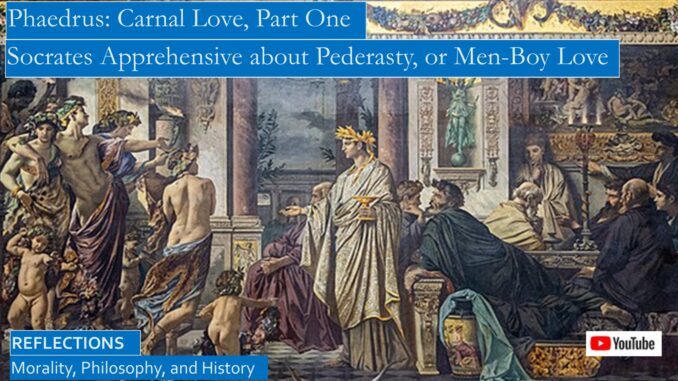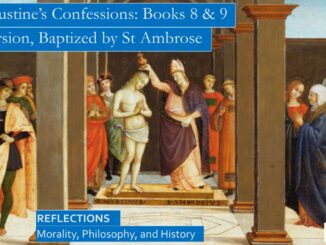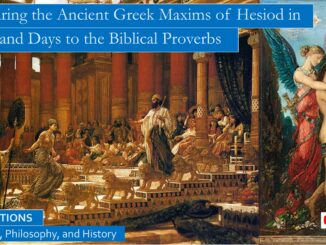
What can we learn by reflecting on the Platonic Dialogue with Phaedrus on love?
How do carnal love and divine love differ? Can romantic love also be divine?
The lover of Phaedrus asks the timeless question, which in modern world can be stated: Should we enjoy our women in the same manner as we enjoy our beer?
How comparable is homosexual love to love between a man and a woman?
YouTube script, with more Amazon book links:
https://www.slideshare.net/BruceStrom1/platos-dialogue-of-phaedrus-on-carnal-love-and-rhetoric-part-1
YouTube video for this blog: https://youtu.be/JFw5ThfwUAg
PLATONIC DIALOGUE OF PHAEDRUS ON LOVE
There is a running joke in the earlier Socratic dialogues of Plato that scholars often miss. Although Socrates proclaims that the unexamined life is not worth living, the running joke is that very few people care about spending time examining their lives, and live imperfect lives according to a moral code they construct that suits their desires. Socrates constantly confronts people in the marketplace, asking questions about important topics like: What is justice? Which in modern terms can be recast as: Do you really love your neighbor? Socrates then angers them when they reveal that they are really not living under a coherent moral code, but rather are living under rules they have cobbled together from vague impressions.
His student Phaedrus is an exception, he is eager to engage in Socratic debate, and is eager to learn wisdom from Socrates. The Platonic dialogue is both about love, and how we can benefit from examining our lives by reflecting on moral philosophy.
The two main dialogues Plato composed on love, the Symposium and Phaedrus, are among his classic dialogues. The Symposium was a dinner party where the guests were too hung over from the night before, and plan a quieter evening giving speeches on love. The guests first offer a series of speeches on romantic love, or carnal love.
The capstone speech is the final speech by Socrates on divine love, this speech is a Socratic dialogue within a Socratic dialogue, and tells of his conversation with his beloved Diotima as she teaches him about divine love, leaving us to wonder: Does Diotima have a touch of the divine herself?
Both the Symposium and the Phaedrus reflect the Greek culture that elevates both married love between a husband and wife and homosexual love, although the ancients would have regarded the concept of homosexual marriage as simply absurd. The purpose of marriage in the ancient world was to raise children who would keep alive the family name as well as take care of you when you are older. Also, in ancient Greece, men delayed marriage until they were established at thirty, whereas women married young in their teens, and since women were often not educated, this meant that men often did not see their young wives as their equals. There were exceptions, the most notable was the wife of Pericles, Aspasia.
Although Socrates does not condemn homosexual love in either dialogue, he is also depicted as being above carnal love, only capable of a philosophical divine love that is only concerned with the goodness of the soul. In the Symposium, the rowdy Alcibiades crashes the dinner party quite drunk, proclaiming how though he and Socrates were the best of friends, even saving his life in the thick of battle, in the end Socrates refused to become his lover.
However, Socrates in the Phaedrus does appear to condone pederasty, the ancient man-boy love where an older man pursues a young nubile teenage boy. This was condoned by many ancient Greeks as a rite of passage, we read how many such couples turn into close friendships when the teenager becomes a man, and the lust subsides in the relationship. This practice was seen objectionable by many Greeks over time, and this manipulativeness of this relationship is likely why the Roman Stoics, then the early Christians, objected to this one-sided relationship. Both Judaism and Christianity forbid male homosexuality of any sort.
We wish to point out that the main reason why so many of Plato’s dialogues have been preserved is that Christian monks found them worthy enough to copy to preserve them for posterity, and the number of manuscripts of Platonic dialogues preserved are second only to the Scriptures. Socrates declines to condemn a practice so deeply imbedded into Greek culture, but he does condemn predatory relationships. We can easily allegorize this dialogue to apply to heterosexual relationships as well.
There is another difference between the Phaedrus and the Symposium. The speeches by the dinner guests in the Symposium all give speeches on imperfect romantic or carnal love, but we can learn moral lessons and be entertained by listening to these speeches. But in the Phaedrus, the first speech is by Lysias, who seeks to seduce Phaedrus with a morally and rhetorically defective speech, since often morally defective propositions cannot withstand logical attacks. In the second speech, Socrates confirms this, and the result is Socrates carefully uncovering these defects, these first two speeches do not teach us any moral lessons, and thus are harder to follow than the related speeches in the Symposium. So, you may wish to view the second part with Socrates’ speech on divine love first, if you primarily wish to learn the moral lessons.
PHAEDRUS PRACTICES THE SPEECH ON NON-LOVERS BY LYSIAS
In the Platonic dialogue we are now pondering, Phaedrus is discussing a speech whereby his male friend Lysias is trying to seduce him, or as we would say, grooming him, with a logically faulty speech that claims that the non-lover is a better lover than the lover who cares about you. This is eerily similar to the modern frat-boy notion that women should be like beer. After all, a bottle of beer is never jealous if we drink another brand of beer, why shouldn’t women likewise be this free from jealousy?
Country song: Why Beer is Better than Women:
https://www.youtube.com/watch?v=oGyaYXzu1oo
Phaedrus meets up with Socrates and invites him to walk with him in the countryside outside the city walls. Socrates is a man of the city, he rarely ventures out into the country, but these friends prefer a pastoral setting to talk about love.
PHAEDRUS: “My tale, Socrates, is one of your sort, for love was the theme which occupied us—love after a fashion: Lysias has been writing about a fair youth who was being tempted, but not by a lover; and this was the point: he ingeniously proved that the non-lover should be accepted rather than the lover.”[1]
Socrates notices the speech tucked into the cloak of Phaedrus and insists that he read it out loud, which is the first speech in the dialogue. Socrates disagrees both with the content of the speech as well as its rhetorical construction, but as Phaedrus is impressed with this speech, he offers to try to salvage the speech if he can, but he only succeeds in constructing a better but still imperfect speech on carnal love rather than divine love.
But then the daimon of Socrates whispers in his ear objecting to the impiety of this speech, insisting that he immediately right the wrong done to the soul of Phaedrus by delivering a proper speech on divine love, which is the third speech of the dialogue.
In the first speech of the dialogue, Lysias argues that the non-lover, someone who seeks to use you for their pleasure, is actually superior to the lover, someone who genuinely cares for you and does not wish to hurt you!
PHAEDRUS, reading the speech by Lysias: Non-lovers are preferable, because “lovers repent of the kindnesses which they have shown when their passion ceases, but to the non-lovers who are free and not under any compulsion, no time of repentance ever comes; for they confer their benefits according to the measure of their ability, in the way which is most conducive to their own interest.” He is actually arguing that selfishness is to be preferred! Perhaps Lysias is suggesting everyone is actually a non-lover, that nobody cares.
“Then again, lovers consider how by reason of their love they have neglected their own concerns and rendered service to others: and when to these benefits conferred, they add on the troubles which they have endured, they think that they have long ago made to the beloved a very ample return. But the non-lover has no such tormenting recollections; he has never neglected his affairs or quarreled with his relations; he has no troubles to add up or excuses to invent; and being well rid of all these evils, why should he not freely do what will gratify the beloved?”
“If you say that the lover is more to be esteemed, because his love is thought to be greater; for he is willing to say and do what is hateful to other men, in order to please his beloved; that, if true, is only a proof that he will prefer any future love to his present, and will injure his old love at the pleasure of the new.”[2] Lysias is accusing lovers as behaving live non-lovers, which makes no sense, since their behavior is what distinguishes them.
Then Lysias argues that the non-lovers are preferable because they far outnumber those who are truly lovers, those who truly care! He who doesn’t care is really the true friend! Indeed, this is further confirmation for any modern-day Lysias that loving women should be seen like drinking beer!
Again, beer drinking song: https://www.youtube.com/watch?v=oGyaYXzu1oo
We have further confirmation that the modern-day Lysias that loving women should be seen like drinking beer! Our Phaedrus continues reciting the speech of Lysias: “But those who are non-lovers, and whose success in love is the reward of their merit, will not be jealous of the companions of their beloved, and will rather hate those who refuse to be his associates, thinking that their favorite is slighted by the latter and benefited by the former; for more love than hatred may be expected to come to him out of his friendship with others.”
Is Lysias actually arguing that polyamory, where cheating on your partner is normalized simply by trying to excuse the cheating, claiming that this evil actually virtuous? Does lack of shame about that conduct which should be shameful transform it into virtuous conduct? Does Lysias truly believe that this would abolish jealousy and fear of abandonment?
Perhaps Lysias is suggesting that homosexuals are more likely to have multiple partners than heterosexuals.
Is Lysias actually arguing that polyamory, where cheating on your partner is normalized simply by trying to excuse the cheating, claiming that this evil actually virtuous? Does lack of shame about that conduct which should be shameful transform it into virtuous conduct? Does Lysias truly believe that this would abolish jealousy and fear of abandonment?
Perhaps Lysias is suggesting that homosexuals are more likely to have multiple partners than heterosexuals.
Lysias, in his speech, next accuses true friends as needy because their love is genuine, comparing them to beggars, calling them empty souls!
“Further, if we ought to shower favors on those who are the most eager suitors,—on that principle, we ought always to do good, not to the most virtuous, but to the most needy; for they are the persons who will be most relieved, and will therefore be the most grateful; and when you make a feast you should invite not your friend, but the beggar and the empty soul; for they will love you, and attend you, and come about your doors, and will be the best pleased, and the most grateful, and will invoke many a blessing on your head.”
This is very close to the Parable of the Great Banquet in Matthew and Luke, where the king holds a wedding banquet, and many of the guests make excuses why they cannot attend. “Then the householder in anger said to his servant, ‘Go out quickly to the streets and lanes of the city, and bring in the poor and maimed and blind and lame.’”[3]
Lysias’ speech continues, but he is attributing virtue to the non-lover:
“Yet surely you ought not to be granting favors to those who besiege you with prayer, but to those who are best able to reward you; nor to the lover only, but to those who are worthy of love; nor to those who will enjoy the bloom of your youth, but to those who will share their possessions with you in age;” “nor to those who care about you for a moment only, but to those who will continue your friendship through life; nor to those who, when their passion is over, will pick a quarrel with you, but rather to those who, when the charm of youth has left you, will show their own virtue. Remember what I have said and consider yet this further point: friends admonish the lover under the idea that his way of life is bad, but no one of his kindred ever yet censured the non-lover.”[4]
There are nuggets of truth sprinkled in Lysias’ grooming speech, and this is often the case in many deceptive speeches, and the most famous example is the speeches of the friends of Job in the Old Testament.
In Genesis God announced to Adam that he would create for him a helpmate, someone who would be partner to help him, not someone subservient that he should always help. Mismatched couplings may succeed if your life has no rocky patches, but if you marry someone who expects that you will always the one who gives and that they only take, and you hit a rough spot when you are the one who needs help and encouragement, you may find that your mate who always preferred taking over giving will not react kindly to this temporary change in the dynamics of the relationship, and may even turn on you and try to destroy you.
The conclusion of the speech of Lysias, read by Phaedrus, includes a truth that seeks to confirm his prior falsehoods: “Perhaps you will ask me whether I propose that you should indulge every non-lover. To which I reply that not even the lover would advise you to indulge all lovers, for the indiscriminate favor is less esteemed by the rational recipient, and less easily hidden by him who would escape the censure of the world. Now love ought to be for the advantage of both parties, and for the injury of neither.”[5]
SOCRATES TRIES TO IMPROVE THE SPEECH BY LYSIAS
Socrates and Phaedrus are conversing while sitting on the grass next to the stream, and Socrates wants to lead his student on the road of wisdom, so he is reluctant to say that Lysias is deceiving him with the speech that seems sweet but is instead predatory. So instead, he proposes to fix the weaknesses he sees in the speech. The primary fault is the speech talks about love but never defines what love is. Is Lysias mixing up lovers and non-lovers? The secondary fault is the speech lacks organization, it is seemingly random thoughts just strung together.
In other words, Socrates wants to improve on a flawed speech that describes a romantic or carnal love, but when he finishes, this second speech in the Phaedrus is simply an improved fundamentally flawed speech, worse than the speeches made by the dinner guests in the Symposium.
The Phaedrus is the rare Platonic dialogue where Socrates offers up prayers to the gods:
SOCRATES prays: “Come, O ye Muses, melodious,” “O help me in the tale which my good friend here desires me to rehearse, in order that his friend whom he always deemed wise may seem to him to be wiser than ever.” Then symbolically, Socrates throws a cloak over his head while he gives this improved imperfect speech, a sign of shame.
SOCRATES, improving on the speech of Lysias: “Once upon a time there was a fair boy, or, more properly speaking, a youth; he was very fair and had a great many lovers; and there was one special cunning one, who had persuaded the youth that he did not love him, but he really loved him all the same; and one day when he was paying his addresses to him, he used this very argument, that he ought to accept the non-lover rather than the lover.”
Socrates is critical that Lysias does not offer a definition of love before he discusses the lover and non-lover, and we don’t know which is the genuine lover for sure as a consequence. Socrates offers a definition of the flawed romantic carnal love:
“The irrational desire which overcomes the tendency of opinion towards right, and is led away to the enjoyment of beauty, and especially of personal beauty, by the desires which are her own kindred—that supreme desire, I say, which by leading conquers and by the force of passion is reinforced, from this very force, receiving a name, is called love,” an erotic love also known as eros.[6]
Then Socrates has Lysias stating that now that love has been defined, “let us now enquire what advantage or disadvantage is likely to ensue from the lover or the non-lover to him who accepts their advances.”
Socrates now has his Lysias describe the lover:
“He who is the victim of his passions, and the slave of pleasure will of course desire to make his beloved as agreeable to himself as possible. Now to him who has a mind diseased, anything is agreeable which is not opposed to him; but that which is equal or superior is hateful to him, and therefore the lover will not brook any superiority or equality on the part of his beloved; he always seeks to reduce him to inferiority. And the ignorant is the inferior of the wise, the coward of the brave, the slow of speech of the speaker, the dull of the clever.”
“Therefore, he cannot help being jealous, and will debar his beloved from the advantages of society which would make a man of him, and especially from that society which would have given him wisdom, and thereby he cannot fail to do him great harm. That is to say, in his excessive fear lest he should come to be despised in his eyes, he will be compelled to banish from him divine philosophy; and there is no greater injury which he can inflict upon him than this. He will contrive that his beloved shall be wholly ignorant, and in everything shall look to him; he is to be the delight of the lover’s heart, and a curse to himself. Verily, a lover is a profitable guardian and associate for him in all that relates to his mind.”[7]
Socrates has Lysias criticizing the lover, and he is clearly describing pederasty, where an older man courts a teenage boy.
“But the lover is not only hurtful to his love;” the much older lover to his teenage love, “he is also an extremely disagreeable companion. The old proverb says that ‘birds of a feather flock together’; I suppose that equality of years inclines them to the same pleasures, and similarity begets friendship; yet you may have more than enough even of this; and verily constraint is always said to be grievous. Now the lover is not only unlike his beloved, but he forces himself upon him. For he is old, and his love is young, and neither day nor night will he leave him if he can help; necessity and the sting of desire drive him on, and allure him with the pleasure which he receives from seeing, hearing, touching, perceiving him in every way. And therefore, he is delighted to fasten upon him and to minister to him.”
“But what pleasure or consolation can the beloved,” the young teenage boy, “be receiving all this time? Must he not feel the extremity of disgust when he looks at an old shriveled face and the remainder to match, which even in a description is disagreeable, and quite detestable when he is forced into daily contact with his lover; moreover he is jealously watched and guarded against everything and everybody, and has to hear misplaced and exaggerated praises of himself, and censures equally inappropriate, which are intolerable when the man is sober, and, besides being intolerable, are published all over the world in all their indelicacy and wearisomeness when he is drunk.”
Socrates observes that many such unbalanced, potentially predatory relationships between older men and teenage boys don’t always end well:
“Not only while his love continues is the older man mischievous and unpleasant, but when his love ceases, he becomes a perfidious enemy of him on whom he showered his oaths and prayers and promises, and yet could hardly prevail upon him to tolerate the tedium of his company even from motives of interest.”
Near the end of this improved speech Socrates realizes that Lysias is comparing the older pederast to a demented lover, inferior to a non-lover, when the older man was never a true lover at all but was only interested in abusing his teenage beloved.
Socrates has Lysias proclaiming, “So the teenage boy flees,” “not knowing that he ought never from the first to have accepted a demented lover instead of a sensible non-lover; and that in making such a choice he was giving himself up to a faithless, morose, envious, disagreeable being, hurtful to his estate, hurtful to his bodily health, and still more hurtful to the cultivation of his mind, than which there neither is nor ever will be anything more honored in the eyes both of gods and men. Consider this, fair youth, and know that in the friendship of the lover there is no real kindness; he has an appetite and wants to feed upon you.”
Socrates ends this speech with a horrid quote: “As wolves love lambs so lovers love their loves.” Socrates changes his mind, and does not wish to recraft the section where Lysias praises the non-lover.
PHAEDRUS objects: “I thought that you were only half-way and were going to make a similar speech about all the advantages of accepting the non-lover. Why do you not proceed?”
Socrates adds that he hesitates to praise the non-lover, regrets the ill-formed speech he cannot rescue, and only wishes to return home. Commentators see symbolism in this appeal by Phaedrus that Socrates remain and discuss further this topic of love:
PHAEDRUS: “Not yet, Socrates; not until the heat of the day has passed; do you not see that the hour is almost noon? There is the midday sun standing still, as people say, in the meridian. Let us rather stay and talk over what has been said, and then return in the cool.”
FINAL SPEECH OF SOCRATES ON DIVINE LOVE
This is when the daimon of Socrates whispers in his ear, that he must make amends, he must correct this false praise of a carnal love that is more manipulative and exploiting than it is romancing. This speech Socrates delivers, not “veiled and ashamed “as he was when trying to recast the irredeemable speech by Lysias, “but with forehead bold and bare.” We reflect on Socrates’ discussion on divine love in our next video.
YOUTUBE
SOCRATES DISCUSSES RHETORIC
Socrates then transitions from discussing the immortality of the soul to the proper use of rhetoric, denying the belief by the Sophists that “rhetoric is a mere routine or trick, not an art. To put it bluntly, there never is nor ever will be a real art of speaking which is divorced from the truth.”[8]
Socrates follows this with a lengthy dialogue about rhetoric, how to be truthful, rhetoric must strive to understand that which it explains, and explain it in a logical manner, not intending to deceive or gaslight the listener with fancy words and misleading rhetorical devices. “For not to know the nature of justice and injustice, and good and evil, and not to be able to distinguish the dream from the reality, cannot in truth be otherwise than disgraceful to him, even though he has the applause of the whole world.” Rhetoric should be based in “principles of justice and goodness and nobility taught and communicated orally for the sake of instruction and graven in the soul,” there should be “clearness and perfection and seriousness” in rhetoric and writing.
Rarely does Socrates pray in his dialogues, but he concludes by praying, “Beloved Pan, and all ye other gods who haunt this place, give me beauty in the inward soul; and may the outward and inward man be at one. May I reckon the wise to be the wealthy, and may I have such a quantity of gold as a temperate man and he only can bear and carry. Anything more? The prayer, I think, is enough for me.”[9]
DISCUSSION OF THE SOURCES
Barnes and Nobles has an excellent collection of the main Platonic dialogues with the classical translation by Benjamin Jowett, which we also found free on the internet in the Gutenberg site.
https://www.gutenberg.org/files/1636/1636-h/1636-h.htm
We also included insights we gained from the Great Courses lectures by the Platonic enthusiast, Professor Michael Sugrue. When listening to his lectures, you can understand how some in the ancient world came to view Socrates and Plato as religious philosophers. The Platonic dialogues, along with the Holy Scriptures, appear to be the most heavily edited manuscripts from the ancient world.
Professor Sugrue points out the symbolism in the dialogues. The discussion in the Phaedrus is held outside the city, near a babbling brook, near nature, they discuss love in the presence of the gods.
[1] The Essential Dialogues of Plato, translated by Benjamin Jowett (New York: Barnes and Noble Classics, 1871, 2005), Phaedrus, 227c, p. 205.
[2] The Essential Dialogues of Plato, Phaedrus, 231a-c, pp. 208-209.
[3] https://www.biblegateway.com/passage/?search=luke+14%3A21&version=RSVCE
[4] The Essential Dialogues of Plato, Phaedrus, 232e-233e, pp. 209-210.
[5] The Essential Dialogues of Plato, Phaedrus, 234c, p. 211.
[6] The Essential Dialogues of Plato, Phaedrus, 237a-238c, pp. 213-214.
[7] The Essential Dialogues of Plato, Phaedrus, 238e-239c, p. 215.
[8] The Essential Dialogues of Plato, Phaedrus, 260e, p. 235.
[9] The Essential Dialogues of Plato, Phaedrus, 253c, p. 253.





4 Trackbacks / Pingbacks